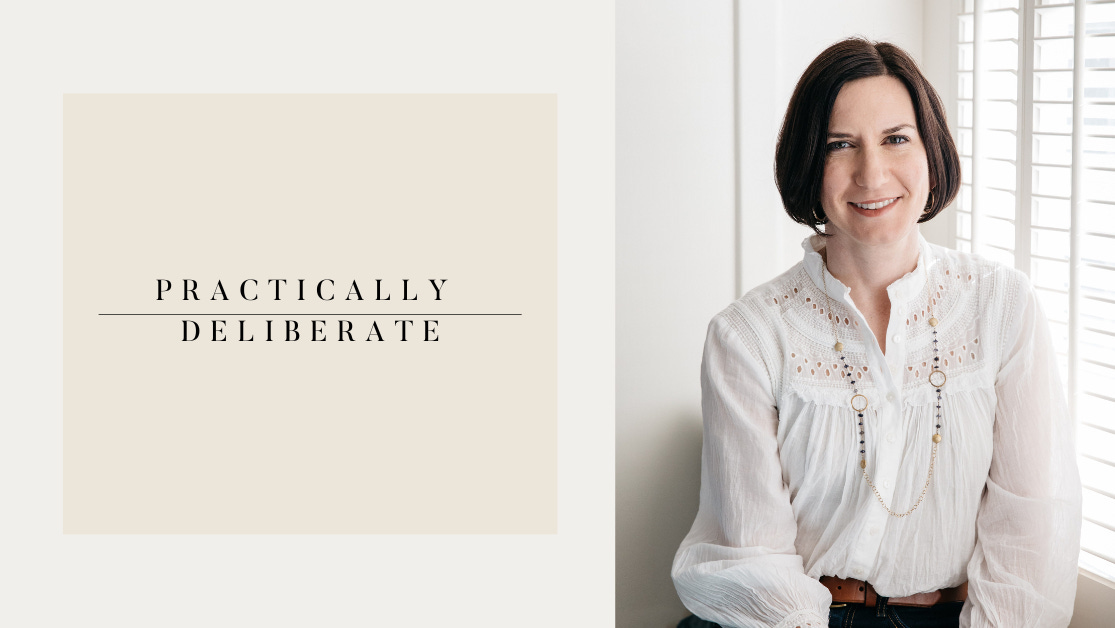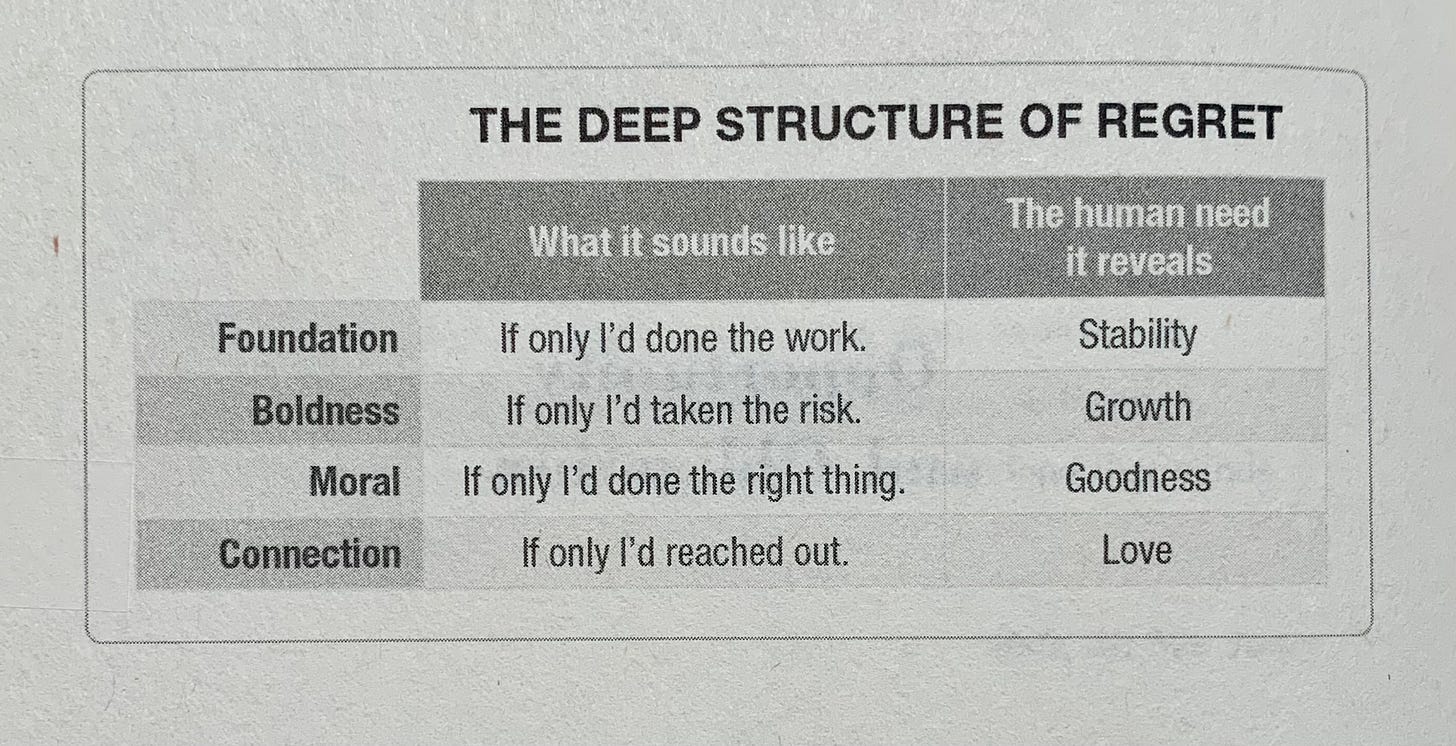Why 'No-Regrets Living' Misses the Point
Regrets have a lot to teach us if we're willing to listen
As the daughter of a librarian, I have a voracious appetite for books. I live in a small footprint home, so I make good use of my local library.
I always have a long list of books on request. Recently, I had to chuckle when I got a notification that two of my requests were ready:
The Life Brief: A Playbook for No-Regrets Living by
ANDThe Power of Regret: How Looking Backward Moves Us Forward by
I liked that these books were seemingly in conversation with each other about the value of regrets.
Truth be told, the books weren’t as conflicting as their titles implied (I also know a thing or two about how much — or, rather, how little — input authors have into book subtitles, so I don’t blame Bonnie Wan for hers).
I liked them both (and added them to my Practically Deliberate: Recommended Reading list).1 They got me thinking a lot about regret as an emotion.
When Myra and I were interviewed during Money and Love’s launch last year, we were asked frequently about the type of decisions that lead to regret. It turns out people really don’t want regrets and are obsessed with avoiding them.
I get it — I feel the same way.
I was familiar with some of the research on regret (cf. my post about leaving my dream job), but The Power of Regret provides a comprehensive primer on this unpopular emotion, and I learned a lot by reading it.
I came away convinced of the book’s purpose — “to reclaim regret as an indispensable emotion” — and in violent agreement with Pink that one can “use its many strengths to make better decisions, perform better at work and school, and bring greater meaning to your life.”2
I’m sharing three insights on how to harness the power of regret to make better decisions — and how I applied them to make a recent one.
Understand the different categories of regret
As part of his research, Pink surveyed nearly 5,000 Americans about regret and collected more than 16,000 regrets from people in 105 countries via the World Regret Survey. When he analyzed this data, he identified four core categories of regret:
Foundation regrets - not being responsible when it comes to our education, health, and finances.
Boldness regrets - not taking a chance or a risk that could lead to growth.
Moral regrets - not doing the right thing.
Connection regrets - not prioritizing relationships with family and friends.
Pink summarizes the categories and the values they reveal in the following chart:
Being aware of the four categories of regret can help us identify whether a decision we’re faced with touches on one (or more) of these categories. If it does, we should take our time making it, which is one of the tenets of Money and Love.
Reflect on past regrets
None of us escapes life without regrets. The key is to avoid letting our regrets haunt us; instead, we should harness them as learning opportunities that help us grow (I know, easier said than done!).
This requires reflection, which can be uncomfortable; if we’re being honest, we’d probably rather forget about the thing we regret. But Pink encourages us to spend some time interrogating our regrets, because they have a lot to teach us.
Whether it’s through writing or talking with others, try reflecting on the following questions related to a significant regret of yours:3
Was the regret one of action (something you did) or inaction (something you didn’t do)?
Does it fall into one of the four categories of regret? Which one?
What would you tell your best friend if they shared this regret with you?
What specific behavior could you adopt to avoid a similar regret in the future?

Anticipate potential regrets
Once you’re familiar with the four core categories of regret and have reflected on your past regrets, the next time you have a decision to make, use the strategy of anticipating regret. This involves mentally time-traveling into the future, imagining you’ve made a decision, and determining if you regret it or not.
It’s similar to the last C of our 5Cs framework (Consequences), which encourages you to play out the potential consequences of a decision across different time horizons.
This isn’t a sure-fire solution, because research shows we frequently overestimate our regrets. This approach can lead us to act too conservatively, especially for those with maximizer tendencies (raises hand).
But when used appropriately, the idea of anticipating regrets — especially one of the four core regrets — can be a valuable tool in your decision-making toolbox.
How I harnessed the power of regret
Last week, I spent three days with my mother-in-law and sister-in-law at Canyon Ranch in Tucson, a resort I’ve described before as “my happy place.”
We were last there together five years ago, to celebrate a milestone birthday (mine). This time, we gathered to give my mother-in-law and sister-in-law some much-needed time to relax, rejuvenate, and focus on themselves after a tough stretch of being there for members of their respective families who needed them.
I love Canyon Ranch, and I love them. But when I learned the dates of the proposed trip, my first thought was that I couldn’t go.
The timing wasn’t ideal. My kids had one of the days off from school and their spring break was two weeks later. Several work-related deadlines would mean I’d be on my laptop a lot during the trip.
It also felt self-indulgent. It’s not an inexpensive place, and this was the first time I’d be going as an entrepreneur, without a steady paycheck to replenish my bank account. I’d attended a meditation retreat in January; this would be my second wellness-focused trip in one quarter.
However, instead of saying no, I let the decision marinate for a few days.
When I asked myself what I’d likely regret more, going or not going, it quickly became clear that if I didn’t go, I’d have a connection regret. I don’t have a sister besides my sister-in-law, and my own mother is no longer alive; I value my relationship with these two women tremendously.
Furthermore, while our gathering happened to be somewhere fabulous, the point was to support my mother-in-law and sister-in-law — not to indulge myself. I talked to my husband about it; he supported my reasoning and agreed to solo parent while I was away.
So I chose connection, and I went. It was lovely. I don’t regret it.
Abby’s Latest
Spring has sprung (at least where I live), and I have an abundance of goodies to share with you, dear Practically Deliberate readers.
In my last post, I mentioned my favorite paper planner. I just reordered more planners for myself and got a few extra to give away to lucky paid Practically Deliberate subscribers. I’ll reach out to you directly if the random name generator selects your name.
I learned so much in my deep dive into regret that I’ve decided to host a free webinar to share more! Join me on Friday, April 12 at 9 am PT for a 30-minute session on How to Make Big Life Decisions You Won’t Regret. You can register for it here. I’ll share more juicy tidbits I’ve learned in my research.
My live, four-week, cohort-based course is now open for registration! Make Big Life Decisions with More Ease and Less Angst launches on April 26. I can’t wait to put evidence-based wisdom, personal stories, and the power of a supportive community to work to help you move forward. All Practically Deliberate readers get $100 off with the code DELIBERATE100. Bonus: the first ten people to complete registration will get a 30-minute 1:1 session with yours truly. If you know someone facing a personal or professional crossroads, I’d appreciate it if you’d share the course with them. You can learn more here.
Deliberately yours,
Abby
The list has affiliate links, so I receive a small commission at no cost to you if you purchase a book from this list (which I use to buy more books).
Daniel H. Pink, The Power of Regret: How Looking Backward Moves Us Forward (New York: Riverhead Books, 2022), p. 13.
Ibid, pp. 183-184.








Ahhh, I love this post on regrets so very much. One more reading recommendation is Robert Leahy's "If Only... Finding Freedom From Regret." I interviewed him for the Psychologists Off the Clock podcast and he has this great take on "productive regret." Such an important topic, thank you for this, Abby!